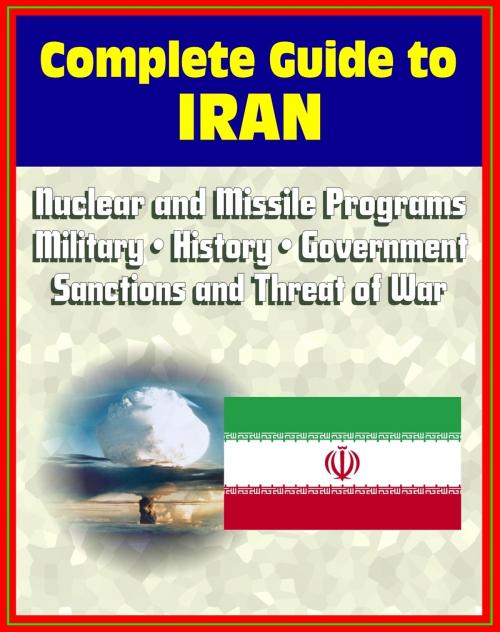2012 Complete Guide to Iran: Authoritative Coverage of Iranian Nuclear and Missile Programs, Sanctions and Threat of War, Regime, Military, Human Rights, Terrorism, History, Economy, Oil Industry
Nonfiction, Travel, Middle East, Social & Cultural Studies, Political Science| Author: | Progressive Management | ISBN: | 9781476053950 |
| Publisher: | Progressive Management | Publication: | April 19, 2012 |
| Imprint: | Smashwords Edition | Language: | English |
| Author: | Progressive Management |
| ISBN: | 9781476053950 |
| Publisher: | Progressive Management |
| Publication: | April 19, 2012 |
| Imprint: | Smashwords Edition |
| Language: | English |
This massive compilation provides a complete picture of Iran and its threatening nuclear weapon and missile programs with nearly a thousand pages of up-to-date information, featuring professional analysis and background data about the nation and its leadership. There is coverage of the government, military, human rights, and much more. The U.S. response to Iran's nuclear program, the Israeli threat to attack Iran, and Iran's threat to close the Strait of Hormuz is included; extensive histories put the current situation into perspective. There is material from many agencies of the American government, including the experts at the Federal Research Division. Iranian country background data provides data on key parameters, people and history, industry, natural resources, and more. The Library of Congress Federal Research Division Country Study is an exceptional review of Iran and its history.
Contents: Chapter 1 - CRS Report on Current Iranian Situation (2012) and Related Material * Chapter 2 - Worldwide Threat Assessment of the US Intelligence Community for the Senate Select Committee on Intelligence - Iran * Chapter 3 - White House Material * Chapter 4 - State Department Material * Chapter 5 - Defense Department Material * Chapter 6 - State Department Human Rights and Terrorism Reports * Chapter 7 - Congressional Material * Chapter 8 - Federal Research Study and Country Profile with Comprehensive Information, History, and Analysis - Politics, Economy, Military * Chapter 9 - Iran Country Material from the CIA and State Department
From the Congressional Research Service Report: The Obama Administration identifies Iran as a major threat to U.S. national security interests. This perception is generated by suspicions of Iran's intentions for its nuclear program— heightened by a November 8, 2011, International Atomic Energy Agency (IAEA) report—as well as by Iran's support for militant groups in the Middle East and in Iraq and Afghanistan. U.S. officials also accuse Iran of helping Syria's leadership try to defeat a growing popular opposition movement and of taking advantage of Shiite majority unrest against the Sunni-led, pro-U.S. government of Bahrain. Tensions have been particularly elevated since Iran's late-December 2011 threat to try to choke off much of the world's oil supplies by attempting to close the Strait of Hormuz—a reaction to the imposition of significant sanctions against Iran's vital exports of oil.
The sense of imminent crisis with Iran—much of which has been brought on by Israeli threats to buck U.S. advice by acting militarily against Iran's nuclear program—follows three years in which the Obama Administration has assembled a broad international coalition to pressure Iran through economic sanctions while also offering sustained engagement with Iran. None of the pressure has, to date, altered Iran's pursuit of its nuclear program: Iran attended December 2010 and January 2011 talks with the six powers negotiating with Iran, but no progress was reported at any of these meetings. However, since the beginning of 2012, as significant multilateral sanctions have been added on Iran's oil exports—including an oil purchase embargo by the European Union to go into full effect by July 1, 2012—there are growing indications that the regime feels economic pressure. Iran's leaders have responded not only with threats to commerce in the Strait of Hormuz, but also stated a willingness to enter into new nuclear talks without preconditions. At the same time, it has begun uranium enrichment at a deep underground facility near Qom. The Administration uses indicators such as Iran's economic deterioration and its willingness to engage in new talks as evidence that policy is starting to work and should be given more time before any consideration of U.S. or other country military options.
This massive compilation provides a complete picture of Iran and its threatening nuclear weapon and missile programs with nearly a thousand pages of up-to-date information, featuring professional analysis and background data about the nation and its leadership. There is coverage of the government, military, human rights, and much more. The U.S. response to Iran's nuclear program, the Israeli threat to attack Iran, and Iran's threat to close the Strait of Hormuz is included; extensive histories put the current situation into perspective. There is material from many agencies of the American government, including the experts at the Federal Research Division. Iranian country background data provides data on key parameters, people and history, industry, natural resources, and more. The Library of Congress Federal Research Division Country Study is an exceptional review of Iran and its history.
Contents: Chapter 1 - CRS Report on Current Iranian Situation (2012) and Related Material * Chapter 2 - Worldwide Threat Assessment of the US Intelligence Community for the Senate Select Committee on Intelligence - Iran * Chapter 3 - White House Material * Chapter 4 - State Department Material * Chapter 5 - Defense Department Material * Chapter 6 - State Department Human Rights and Terrorism Reports * Chapter 7 - Congressional Material * Chapter 8 - Federal Research Study and Country Profile with Comprehensive Information, History, and Analysis - Politics, Economy, Military * Chapter 9 - Iran Country Material from the CIA and State Department
From the Congressional Research Service Report: The Obama Administration identifies Iran as a major threat to U.S. national security interests. This perception is generated by suspicions of Iran's intentions for its nuclear program— heightened by a November 8, 2011, International Atomic Energy Agency (IAEA) report—as well as by Iran's support for militant groups in the Middle East and in Iraq and Afghanistan. U.S. officials also accuse Iran of helping Syria's leadership try to defeat a growing popular opposition movement and of taking advantage of Shiite majority unrest against the Sunni-led, pro-U.S. government of Bahrain. Tensions have been particularly elevated since Iran's late-December 2011 threat to try to choke off much of the world's oil supplies by attempting to close the Strait of Hormuz—a reaction to the imposition of significant sanctions against Iran's vital exports of oil.
The sense of imminent crisis with Iran—much of which has been brought on by Israeli threats to buck U.S. advice by acting militarily against Iran's nuclear program—follows three years in which the Obama Administration has assembled a broad international coalition to pressure Iran through economic sanctions while also offering sustained engagement with Iran. None of the pressure has, to date, altered Iran's pursuit of its nuclear program: Iran attended December 2010 and January 2011 talks with the six powers negotiating with Iran, but no progress was reported at any of these meetings. However, since the beginning of 2012, as significant multilateral sanctions have been added on Iran's oil exports—including an oil purchase embargo by the European Union to go into full effect by July 1, 2012—there are growing indications that the regime feels economic pressure. Iran's leaders have responded not only with threats to commerce in the Strait of Hormuz, but also stated a willingness to enter into new nuclear talks without preconditions. At the same time, it has begun uranium enrichment at a deep underground facility near Qom. The Administration uses indicators such as Iran's economic deterioration and its willingness to engage in new talks as evidence that policy is starting to work and should be given more time before any consideration of U.S. or other country military options.















